Satires are a staple of the film industry, providing powerful social commentary when done well. The best satire movies use this technique subtly and don’t hit you over the head with it, but still find ways to make their point. Satires take a familiar story or genre and make fun of it through imitation, often providing a comedic spin on serious issues. These films are capable of providing social or political critique, while at the same time entertaining audiences through often hilarious means. With that in mind, here are 20 of the best satire films ever made.
20. District 9 (2009)
Many satire films are comedies, as the genre naturally lends itself to poking fun at something in the real world. District 9, however, is not one of those films. Instead, it’s a rather brutal on-the-nose message about apartheid in South Africa (even using the city of Johannesburg as the setting). Rather than separating living things based on skin color, writer and director Neil Blomkamp uses a race of aliens to serve as the lower class citizens in this 2009 movie.
The aliens, which are even given their own racial slur (“prawns”) in the film, are seen as dirty, weak, and a drain on society. The main human character, Wikus van der Merve (Sharlto Copley), endures an accident that sees him transform from a respected government authority into one of the aliens. It’s a slow process, and the film explores exactly how different he is treated once people start to believe he is “one of them.”
The film, although obviously fictional, is made to look like a documentary. If you substituted a minority race in for the aliens, it would be less of a sci-fi movie and more of a chilling tale of how terrible human beings can treat each other.
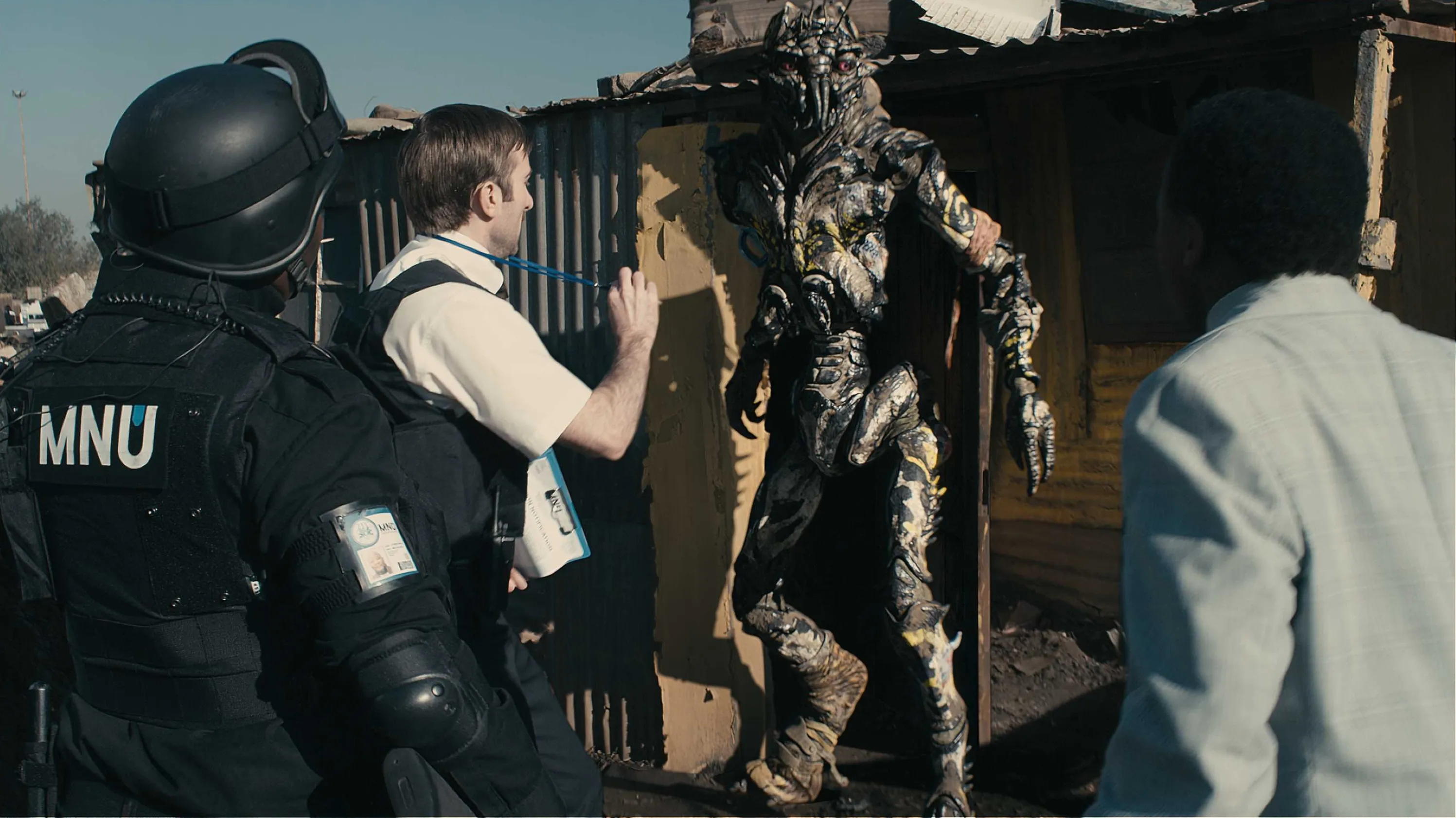 Screenshot via TriStar Pictures
Screenshot via TriStar Pictures19. Attack the Block (2011)
One of the more underrated movies on this list, the 2011 sci-fi comedy horror flick Attack the Block is an interesting project. Not only did it help turn John Boyega and Jodie Whittaker into huge stars (Boyega would go on to star in the new Star Wars films and Whittaker became the 13th Doctor in Doctor Who), but it was a smart piece of British social satire from director Joe Cornish.
In short, the movie is about a small gang of local thugs defending their South London block from a strange alien invasion. However, the film dives deeper into the subject by showing that the characters are really just confused young boys, struggling to gain acceptance from their peers and their criminal bosses. At the same time, they are portrayed as heroes for defending their community. And naturally, when the police finally show up, they fail to grasp the situation and react by robotically arresting the wrong people.
It’s a clever social commentary on the stereotypes of teenagers and life in the inner cities. It also has terrifying hairy alien creatures, creating an awesome mash-up!
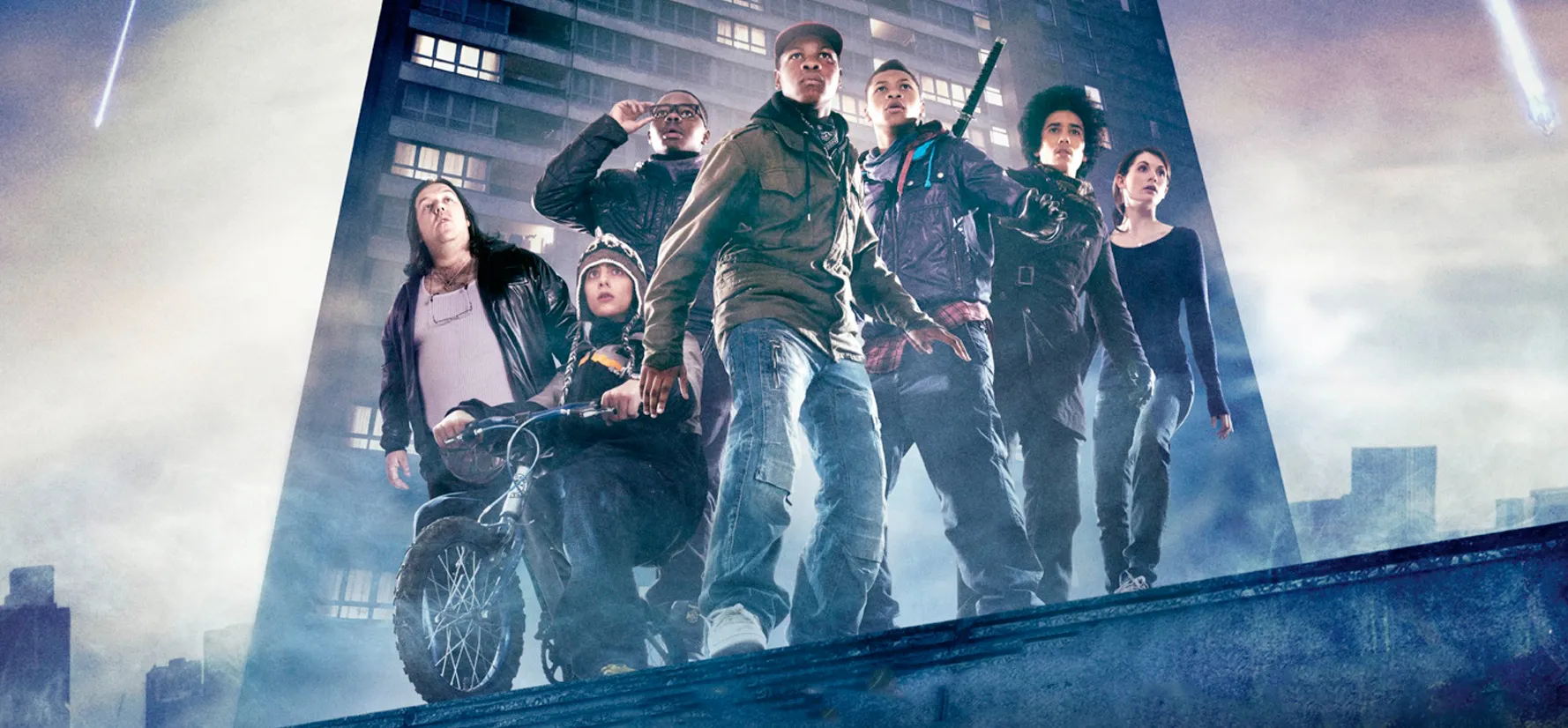 Photo via Optimum Releasing
Photo via Optimum Releasing18. Borat (2006)
Technically, the full title of this movie is Borat: Cultural Learnings Of America For Make Benefit Glorious Nation of Kazakhstan. But that’s a mouthful, so we’ll trim it down for the rest of this entry. Borat is one of Sacha Baron Cohen’s most famous alter egos — a supposed television reporter from Kazakhstan attempting to learn about the modern world.
By crafting a hilariously naive character that is in on the joke with the audience, Borat manages to satirize the very nation he is supposed to be exploring. He exposes some of America’s dirtiest corners, including racism, sexism, and a general lack of common sense. On the other hand, so many people are willing to help this foreign man learn about the great parts of America. In that sense, the movie also touches on the generosity of Americans, despite some of their faults.
Borat is also a satire on reality TV as a genre, with Cohen refusing to ever break character and often taking the jokes way too far with his unsuspecting co-stars.
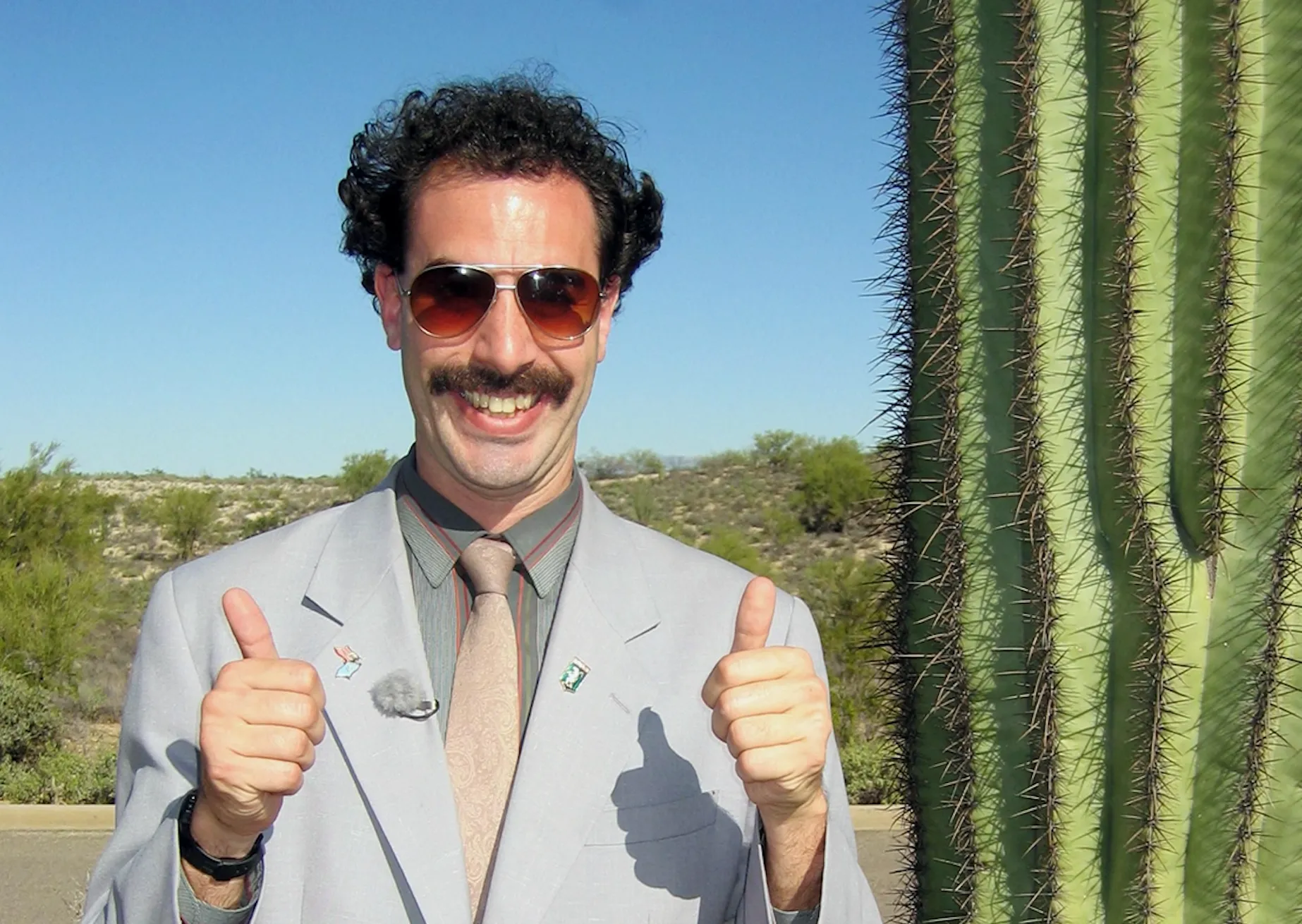 Screenshot via 20th Century Fox
Screenshot via 20th Century Fox17. Get Out (2017)
To some people, Get Out was nothing more than a stylish horror film from a surprising source: funnyman Jordan Peele, who has risen to fame as a comedian, especially on Mad TV and later on the Key & Peele sketch show. However, it wasn’t hard for most viewers to see the obvious satirical racial themes in the movie. Really, you would have to be half-blind or completely ignorant to miss them.
Ignoring the “black guy always dies in horror films” trope, Peele crafts a terrifying story of how a bunch of wealthy white folks secretly auction off young black men in order to perform some sort of mind transplant surgery, giving them a chance to be younger, cooler, hotter, better at sports (or sex), or simply whatever non-racial talent exists in their poor victim. In the case of Chris Washington (Daniel Kaluuya) in Get Out, he is “bought” for his incredible eye for photography.
The show smartly builds the racial tension in early scenes, including Chris making sure that his girlfriend Rose has told her family that she’s dating a black man, and a frustrating encounter with a local police officer that sheds light on the realities of being black in America. Later, positive references to Barack Obama from white characters that are supposed seem welcoming come across as patronizing. Given the current social and political climate of the world, Get Outdishes out the critiquing satire in ways that remind us we still have a long way to go when it comes in inclusiveness.
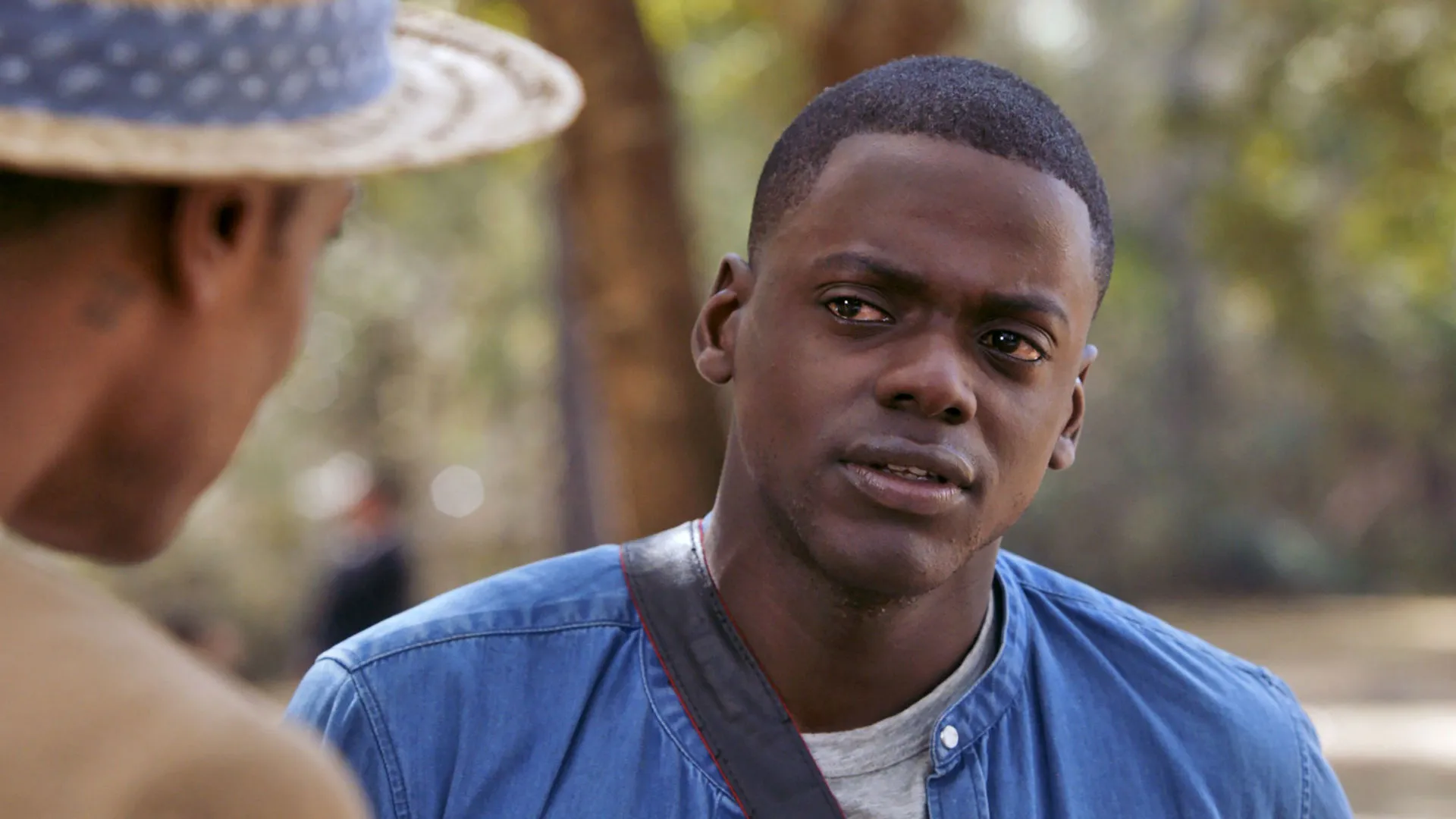 Screenshot via Universal Pictures
Screenshot via Universal Pictures16. What We Do in the Shadows (2014)
How do you satire serious brooding vampire movies like Interview With The Vampire, popcorn young adult romantic atrocities like Twilight and reality TV all at once? The answer is What We Do in the Shadows, a brilliantly funny film by Jemaine Clement and Taika Waititi. It’s about a foursome of vampire roommates living in modern New Zealand, struggling to combine their Old World customs with the 21st century.
The movie pokes fun at all genres of vampire content, including Buffy The Vampire Slayer, Blade, and The Lost Boys. It also truly embraces the “mockumentary” feel, with characters speaking directly to the camera, and even having the “film crew” get themselves into some trouble at a local masquerade ball filled with zombies, witches, and other undead or supernatural beings.
What We Do in the Shadows doesn’t rely on slapstick gags or gross-out gore. The jokes are clever, delivered with excellent timing and a sophisticated wittiness. These vampires are bloodthirsty killing machines, sure, but they are also insecure and the most uncool people in town. It makes for a great combination. The film gained a cult following after it was released in 2014, and a TV series spin-off (with the same name, but different characters) was released in 2019.
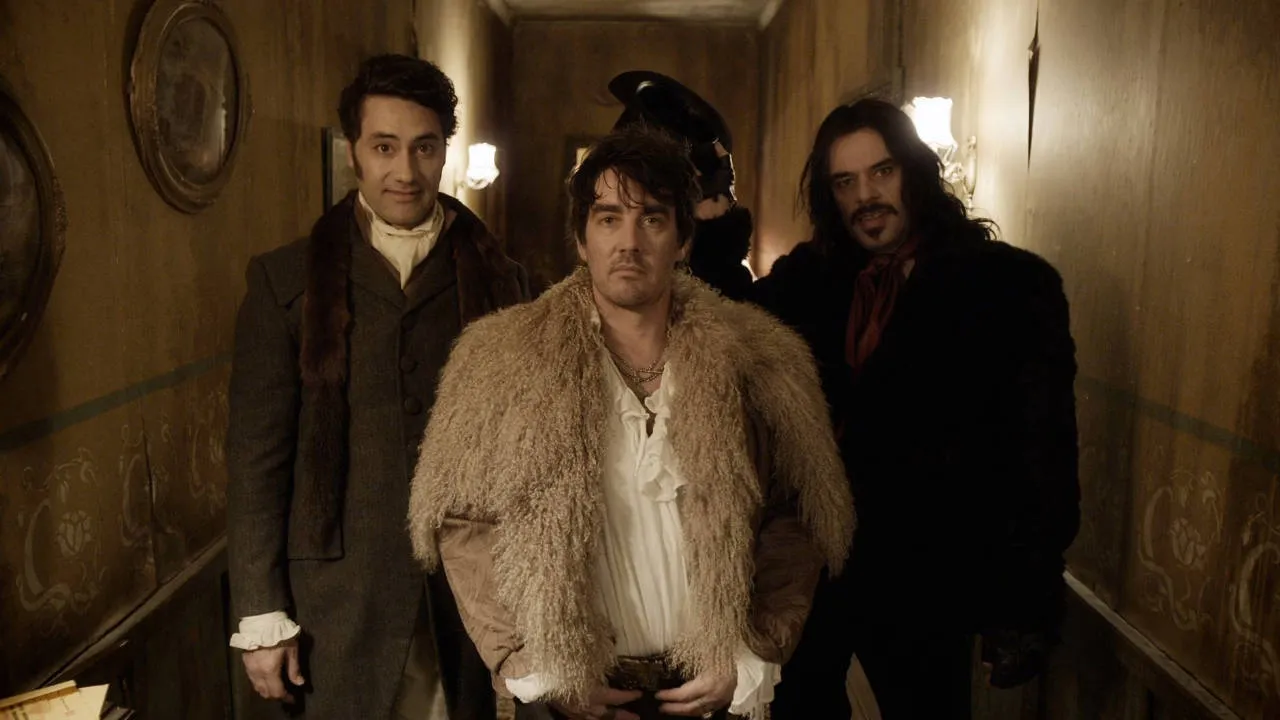 Screenshot via Paramount Pictures
Screenshot via Paramount Pictures15. The Interview (2014)
If you consider which films have made the most sensational headlines the past decade, there is a good chance that The Interview will be near the top of the list. This satirical comedy stars James Franco and Seth Rogen as a pair of journalists offered the chance to interview North Korean dictator Kim Jong-un. Before they go, however, the pair are recruited by the CIA to assassinate the powerful political leader. The concept didn’t sit well with the North Korean government, who threatened violence against the USA if the film was released.
The Interview was lambasted by North Korean media and the film was initially delayed. In fact, it never actually made it into theaters, as Netflix snatched up the rights and put it straight onto their streaming service (but not before it was illegally leaked and downloaded by millions of people). The film, which has become even more relevant in recent years, features some fantastic political satire as well as paying homage to spy films of the 1960s and 70s.
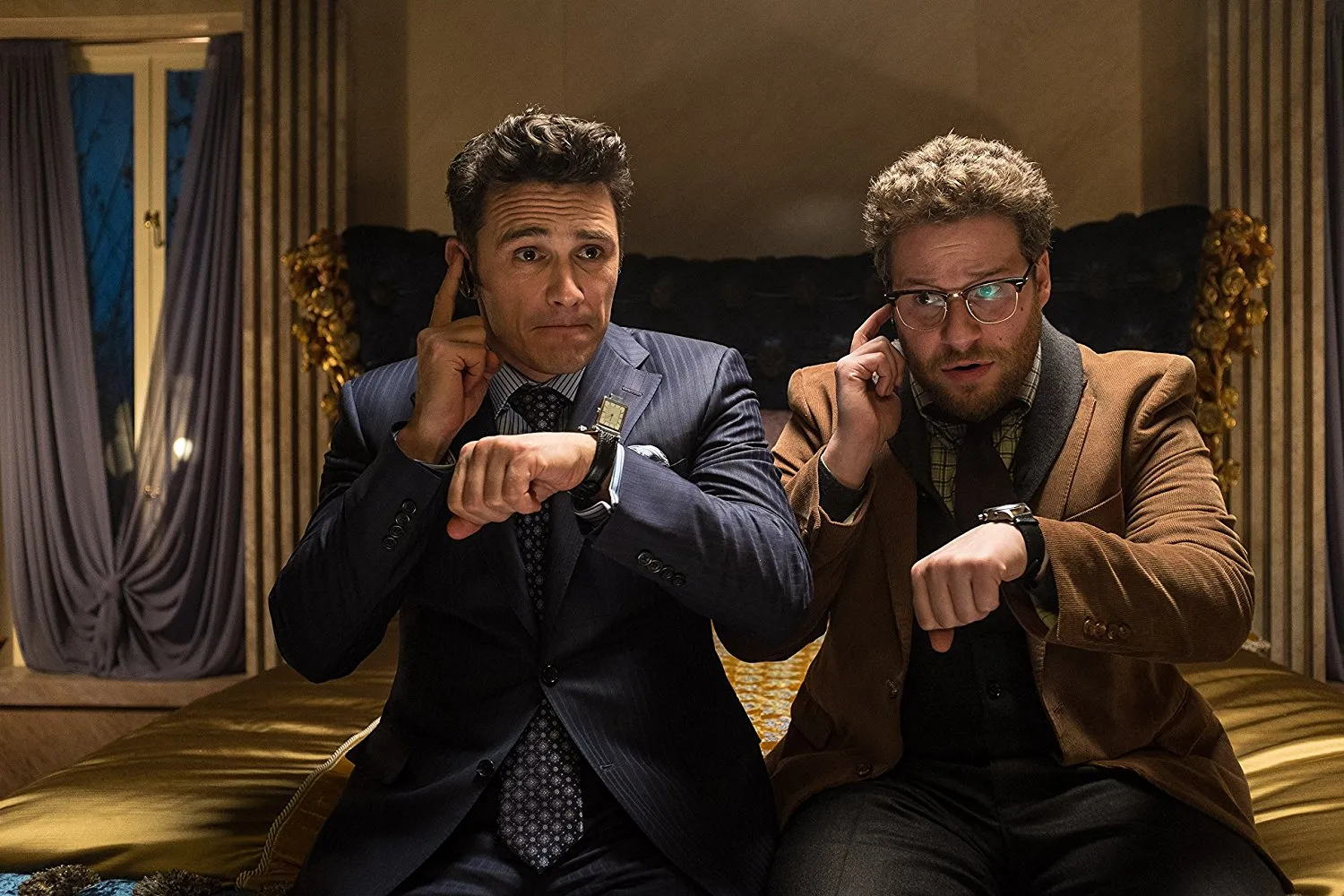 Screenshot via Sony Pictures
Screenshot via Sony Pictures14. Office Space (1999)
The 1999 film Office Space is a sharp satirical comedy about the mundane idiosyncrasies of the day-to-day grind of the 9-5 desk job. Written and directed by the ever under-appreciated Mike Judge, whose works of satire are almost always smart, funny and painfully truthful, Office Space’s sympathetic depiction of ordinary IT workers garnered a cult following within the field, but also addresses themes familiar to white-collar employees and the workforce in general. Office Space is arguably Judge’s best work and features standout performances from Ron Livingston, Jennifer Aniston, Gary Cole, and Stephen Root.
Although Office Space was not a big success at the box office, making $12.2 million against a $10 million production budget, it was well-received by critics and sold well on home video, becoming a cult favorite in the process. A true modern classic, Office Space is a movie that is scarily relatable for anyone who has spent time as a cubicle drone.
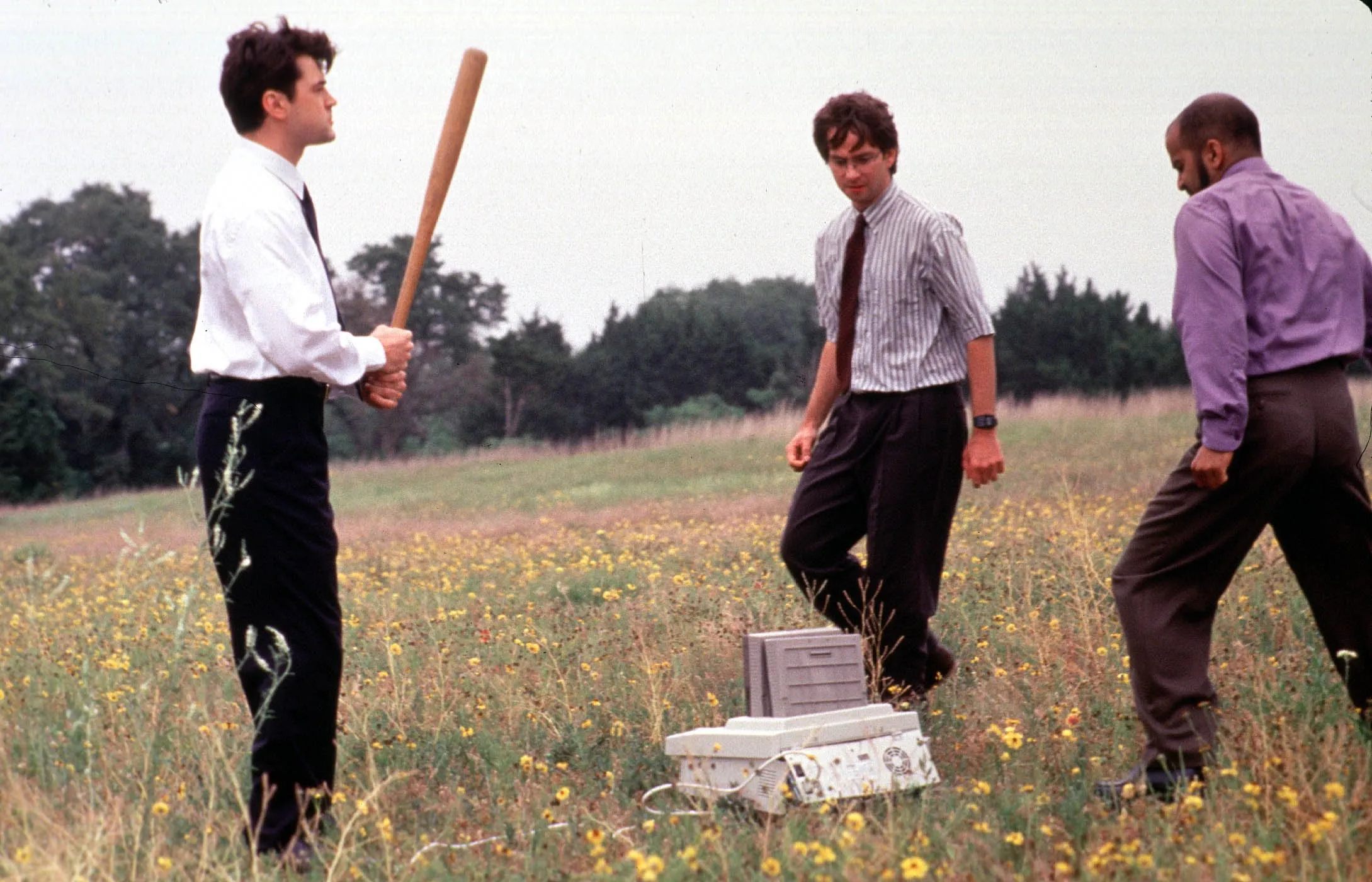 Screenshot via 20th Century Fox
Screenshot via 20th Century Fox13. Fight Club (1999)
Fight Club is a 1999 film based on the Chuch Palahniuk novel of the same name. The film stars Brad Bitt and Edward Norton, with both actors turning in powerful and career-defining performances, and the two form an electrifying dynamic which has helped make Fight Club a modern classic. Norton plays the nameless main character and narrator, who meets Tyler Durden on a flight. Tyler is charming but anti-materialistic, and the pair’s hyper-masculine bonding leads them to form the titular “Fight Club.”
The film’s satirical components tackle the consumer culture, lifestyle branding, and constructions of masculinity, with Norton’s character often breaking the fourth wall and speaking directly to the audience. Fight Club failed to meet the studio’s expectations at the box office and initially received polarizing reactions from critics, becoming one of the most controversial and talked-about films of the year. However, many praised the acting, directing, and themes, and over time the critical and public reception towards Fight Club has become largely positive.
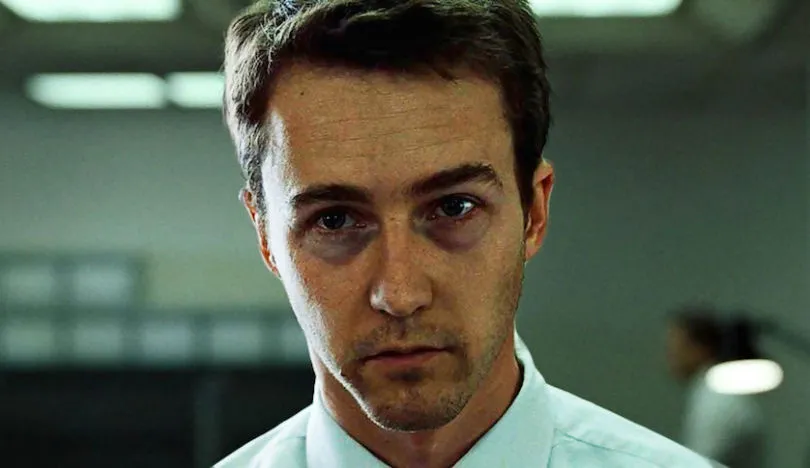 Screenshot via 20th Century Fox
Screenshot via 20th Century Fox12. Kung Fu Hustle (2004)
2004’s Kung Fu Hustle is a wildly entertaining film about gangsters in 1940s China who dance in perfect lockstep with each other while wielding hatchets, shooting Tommy guns and running at light speed—all set to a soundtrack that includes the song “Ballroom Blitz.” The Kung Fu fights in this film are massive and feature a cast of hundreds, and the action is completely over-the-top—with bodies, limbs, and objects flying every which way. The film provides a comedic satire of everything from political and social issues to the Kung Fu film genre itself.
Critic Roger Ebert described Kung Fu Hustle as “a film in which Jackie Chan and Buster Keaton meet Quentin Tarantino and Bugs Bunny.” That about sums up this totally weird Kung Fu film made by Steven Chow. Kung Fu Hustle performed surprisingly well in North America and ranks as the tenth highest-grossing foreign-language film of all time, as well as the highest-grossing foreign-language film in 2005.
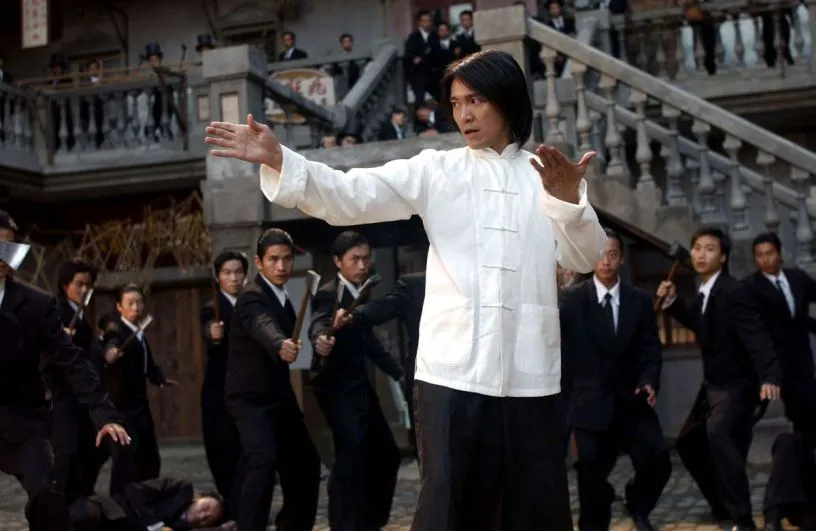 Screenshot via Sony Pictures
Screenshot via Sony Pictures11. Hot Fuzz (2007)
Hot Fuzz is the story of two mismatched British police officers who take it upon themselves to solve a series of strange and peculiar murders in a small English village. The interactions between the two leads, played by Simon Pegg and Nick Frost), are hilarious from end-to-end and the characters work extremely well off of each other. Hot Fuzz is a satire of the buddy cop genre that also pays homage to over-the-top action films made popular by filmmakers like Michael Bay, complete with slow-motion explosions and lens flares.
The film’s wonderful combination of action, mystery, and comedic satire makes it a must-watch, with writer-director Edgar Wright (Baby Driver) doing a masterful job behind the camera. On the heels of Wright’s feature film debut, the horror-comedy Shaun of the Dead, Hot Fuzz was well received by critics and performed well at the box office. With a smart, punchy script and expertly choreographed action set pieces, Hot Fuzz is a film that holds up extremely well even more than a decade after its initial release.
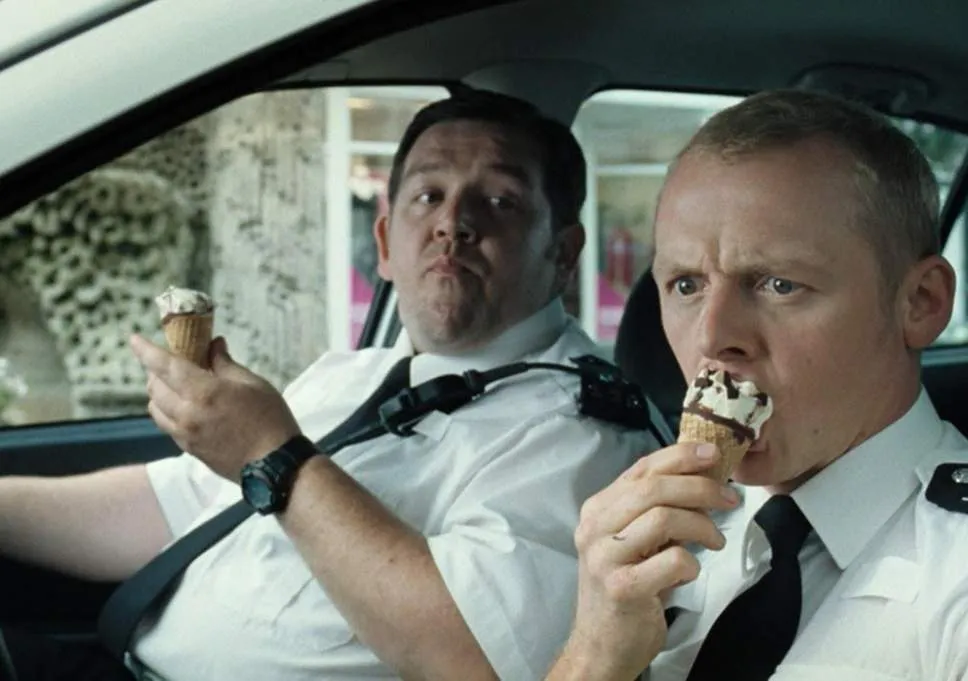 Screenshot via Rogue Pictures
Screenshot via Rogue Pictures10. Team America: World Police (2004)
Much like the film The Interview, 2004’s Team America World Police features a North Korean dictator as the film’s central villain. This hilarious film is inspired by the 1960s Thunderbirds television series, in which marionettes are featured as actors in spy and thriller mini-dramas that appealed to adults and children alike. Team America is a satire of American society, culture, the nature of power and the celebration of style over substance. The film also satirizes big-budget action films and their associated cliches and stereotypes, with particular humorous emphasis on the global implications of United States politics.
Even the film’s title is derived from domestic and international political criticisms that the foreign policy of the United States frequently and unilaterally tries to “police the world”. Team America: World Police had moderate success in theaters and received mostly positive reviews from critics. The film received a 77% approval rating on Rotten Tomatoes with the consensus stating “Team America will either offend you or leave you in stitches. It’ll probably do both.” Team America: World Police is a wonderful piece of satire that may be even more relevant today than in its time of release.
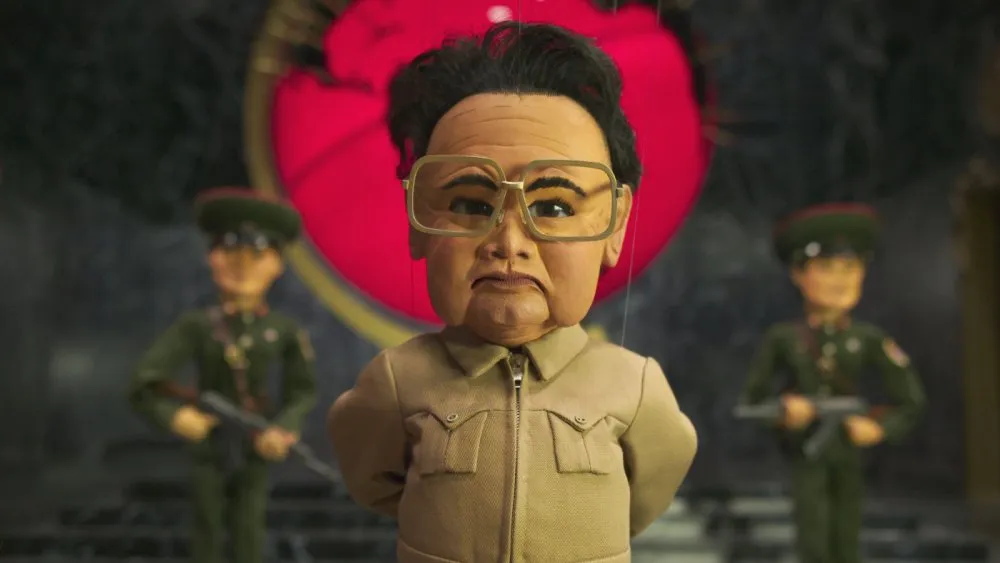 Screenshot via Paramount Pictures
Screenshot via Paramount Pictures9. Thank You For Smoking (2005)
2005’s Thank You For Smoking revolves around Aaron Eckhart’s Nick, a spin doctor for the Academy of Tobacco Studies, an institution created by the major cigarette companies to deflect health concerns of their product. With teen smoking on the decline, the original Marlboro Man (Sam Elliott) dying of cancer, and a liberal senator (William H. Macy) campaigning to slap skull-and-crossbones stickers on cigarette packaging, the Academy will do anything possible to keep people smoking.
The film is a satirical comedy that focuses on the absurdities of socio-political behavior in the early 21st Century. Thank You For Smoking features a fantastic ensemble cast with Maria Bello, Adam Brody, Sam Elliott, Katie Holmes, Rob Lowe, William H. Macy, J. K. Simmons, and Robert Duvall appearing in supporting roles. The film was well-received despite earning just under $40 million at the box office and is a clever piece of filmmaking, featuring some of the better comedic satire released in the past few decades.
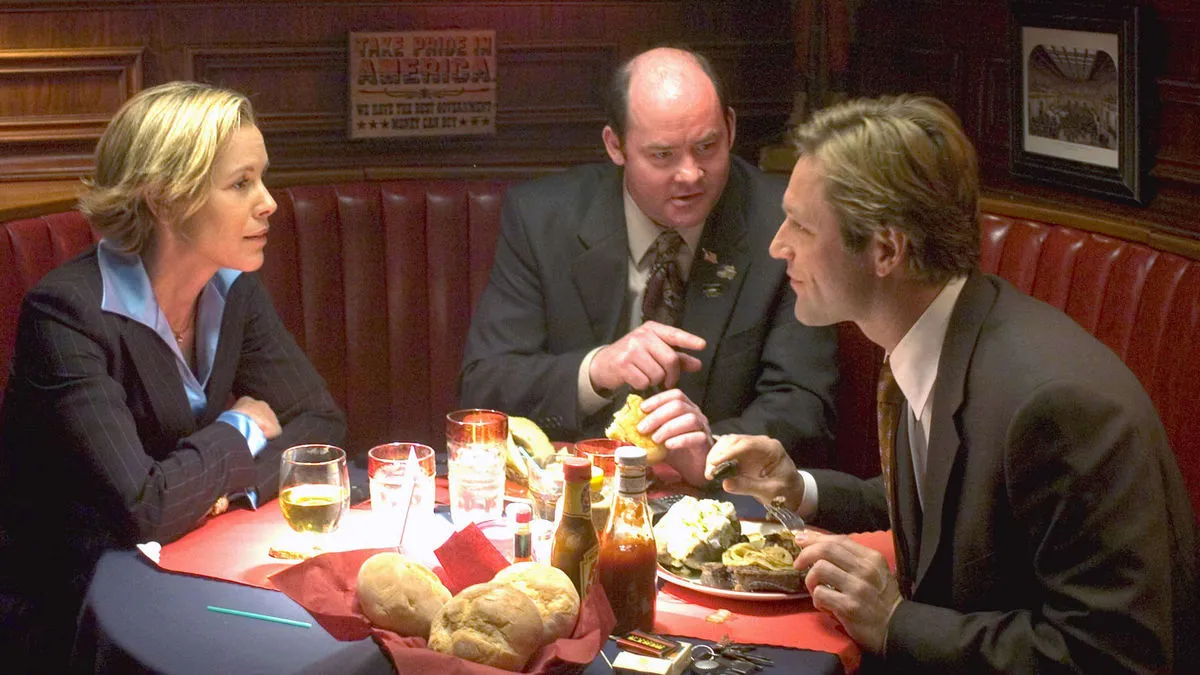 Screenshot via Fox Searchlight Pictures
Screenshot via Fox Searchlight Pictures8. Idiocracy (2006)
The 2006 film Idiocracy tells the story of two people who take part in a top-secret military human hibernation experiment, only to awaken 500 years later in a dystopian society where anti-intellectualism and commercialism have displaced intellectual curiosity, social responsibility, and coherent notions of justice and human rights. Another hidden gem from Mike Judge, Idiocracy provides a satirical look at an exaggerated version of America, where everyone including lawmakers and government officials are complete morons.
Recently, the film’s writer said the world of Idiocracy had become all too real. “I never expected Idiocracy to become a documentary,” said Etan Cohen, who co-wrote the film with Judge. The film features a memorable performance from actor Terry Crews, who plays President Dwayne Elizondo Mountain Dew Herbert Camacho. Idiocracy never received a wide theatrical release, though it’s managed to find a widespread cult following in the years since its release. Despite the film’s lack of notoriety, Idiocracy is worth seeking out, even if it has ended up being a surprisingly accurate portrayal of the future.
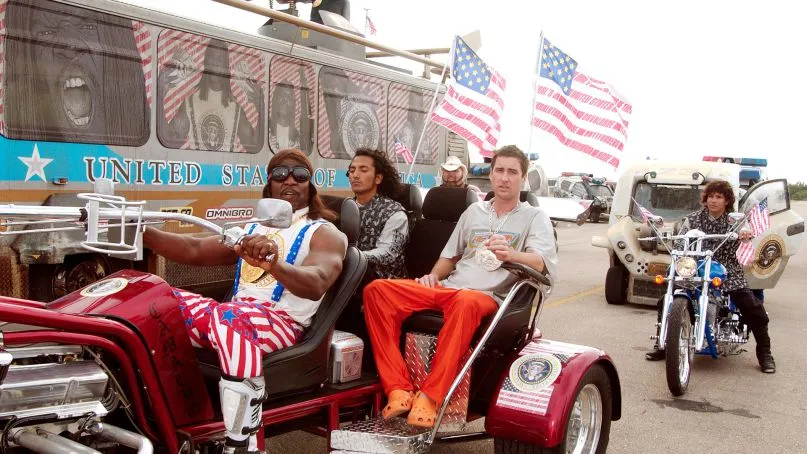 Screenshot via 20th Century Fox
Screenshot via 20th Century Fox7. Tropic Thunder (2008)
Tropic Thunder stars Ben Stiller, Jack Black, Robert Downey Jr., Jay Baruchel, and Brandon T. Jackson as a group of prima donna actors who are making an expensive Vietnam War film. Tugg Speedman (Ben Stiller) is a pampered action superstar who sets out for Southeast Asia to take part in the biggest, most-expensive war movie ever produced. Soon after filming begins, he and his co-stars, Oscar-winner Kirk Lazarus (Robert Downey), comic Jeff Portnoy (Jack Black) and the rest of the crew, must become real soldiers when they’re unexpectedly dropped in the Golden Triangle, home of a ruthless gang of heroin-producers.
The film’s ridiculous premise serves as a background for a satirical takedown of the film industry and, more specifically, the use of roles by big-name actors to inspire compassion simply as a medium for praise. The attack of Tropic Thunder on the established methods of the film industry is well crafted and hilarious. The film received generally positive reviews from critics with praise being placed on the film’s characters, story, faux trailers, and the performances of Stiller, Downey, Black and Tom Cruise. However, Tropic Thunder also saw its fair share of criticism thanks to the satirical depiction of the mentally handicapped and usage of blackface makeup in the film.
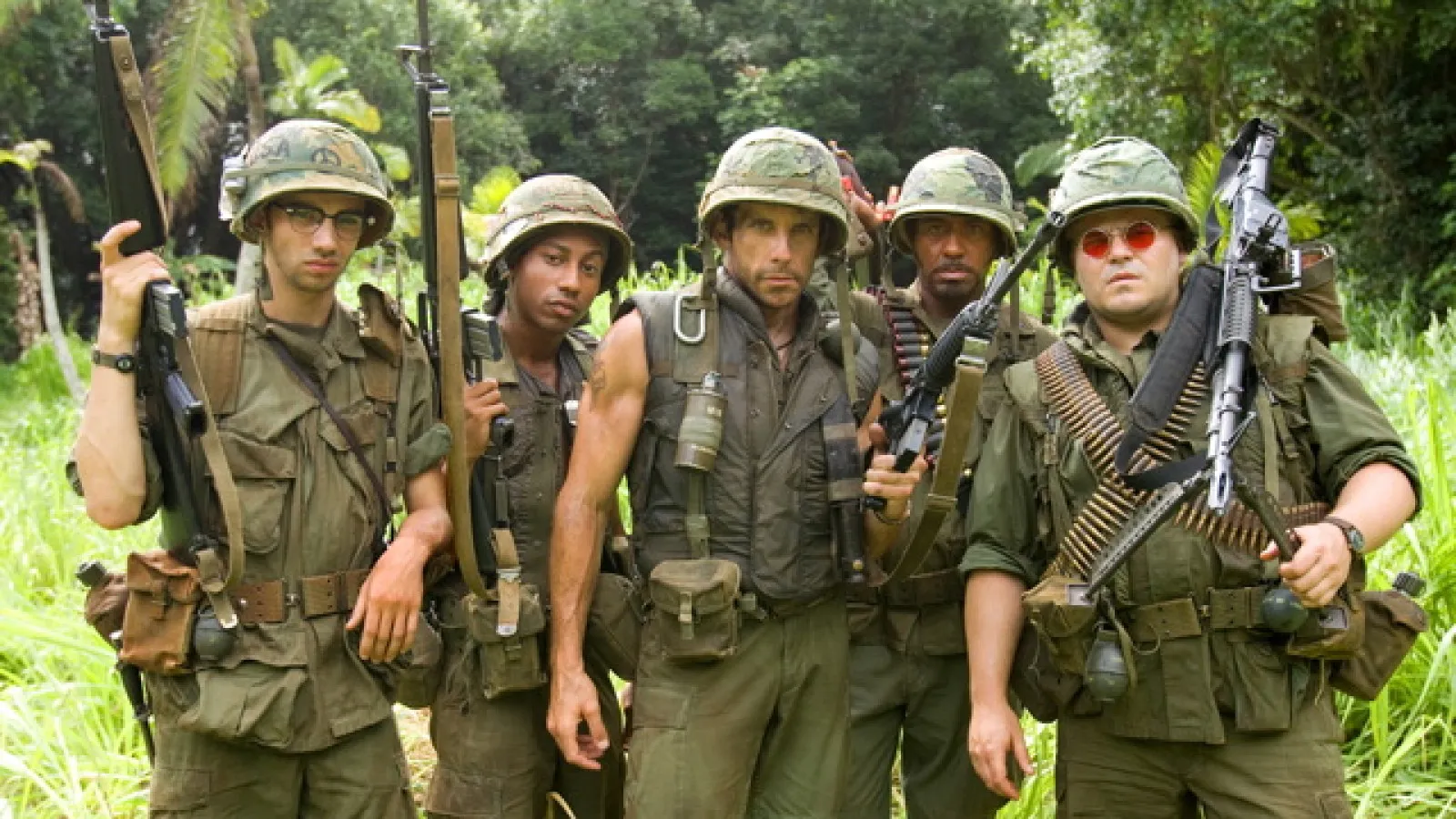 Screenshot via Paramount Pictures
Screenshot via Paramount Pictures6. WALL-E (2008)
While Disney-Pixar’s WALL-E does not immediately stand out as satire, the film features a number of themes that can be read as a commentary on modern society. The film’s central plotline sees the planet Earth turned into one huge garbage pile after decades of abuse and all of the humans are forced to leave on spaceships. The film picks up centuries after the aforementioned ecological disaster, following the adorable little robot WALL-E as he works to clean up the Earth in hopes that humans can one day return. The humans in this movie are depicted as obese and lazy, living in a world of automation where they are free to eat, drink and watch TV all day.
While the film is an exaggeration of the excess and waste produced by humans, it provides insight into what may be in store for future generations. WALL-E was a massive critical and financial success for Disney, grossing over $530 million and earning several award nominations including Best Animated Picture at the Academy Awards. The film’s satire of today’s society and its important environmental message add depth to this story of an adorable robot looking for love in a dystopian future.
 Screenshot via Pixar/Disney
Screenshot via Pixar/Disney5. Airplane! (1980)
Airplane! is a satire of the disaster movie genre that was popular during the 1960s and 70s. The Airport series were popular in preceding years and became reliable box office draws. The third and final film in the series, Airport ’79, was so campy that it was marketed as a comedy and as a result, it wasn’t much of a stretch to take things one step further. For Airplane!‘s story skeleton, they selected the 1957 air danger story Zero Hour, but the film’s premise had little in common with the earlier “serious” endeavor beyond common plot points and central characters.
Written and directed by brothers David and Jerry Zucker as well as Jim Abrahams, the film stars Robert Hays and Julie Hagerty, and also features Leslie Nielsen, Robert Stack, Lloyd Bridges, Peter Graves, Kareem Abdul-Jabbar, and Lorna Patterson. Airplane! is renowned for its use of surreal humor and its fast-paced slapstick comedy, including visual and verbal puns, gags and obscure humor like propeller sound effects for a jet plane. This ridiculous film will have you in stitches and its absurd humor is still funny nearly forty years later.
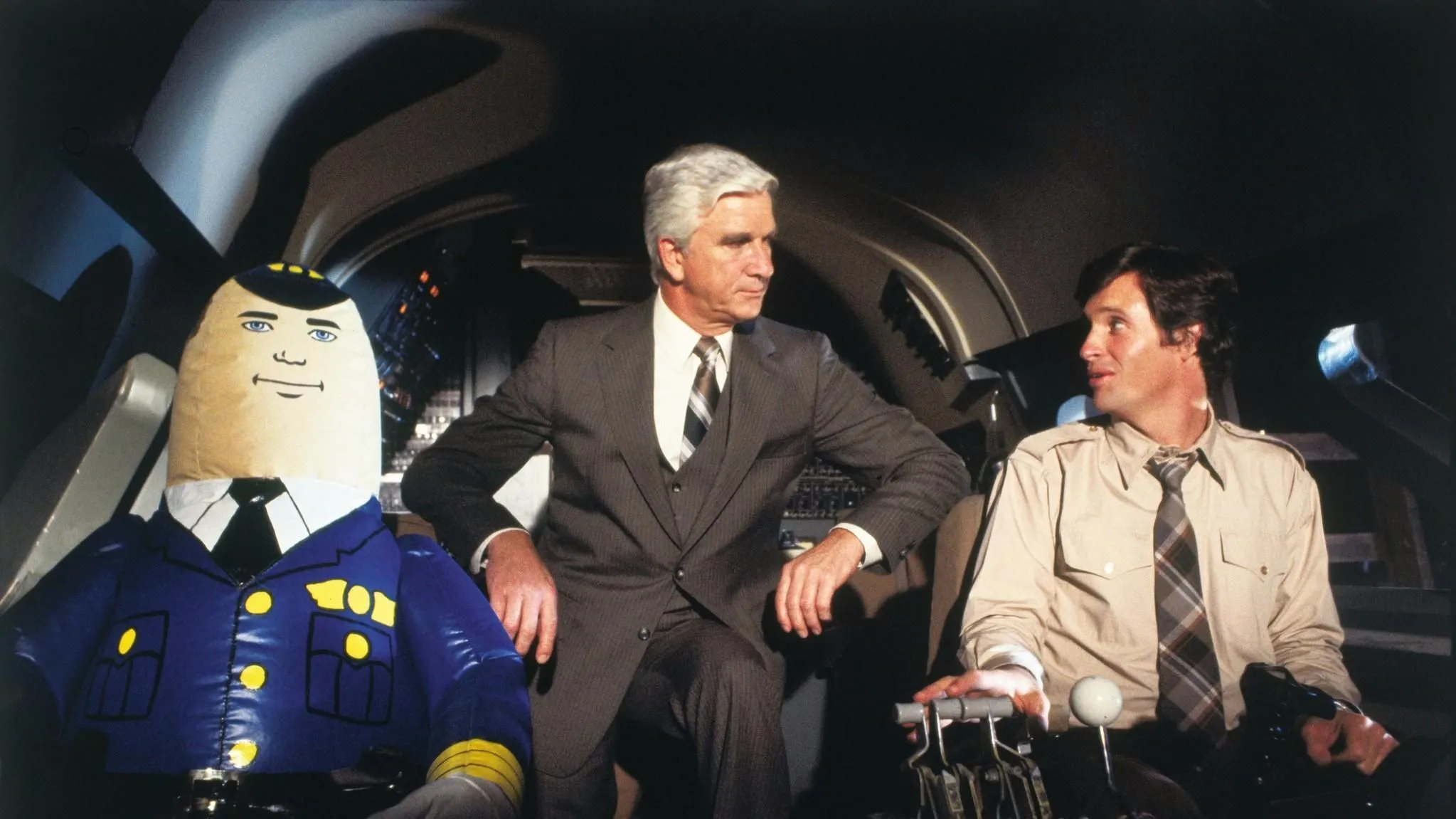 Screenshot via Paramount Pictures
Screenshot via Paramount Pictures4. Network (1976)
Although the 1976 political satire film Network was released over four decades ago, the subject matter may be more relevant than ever considering today’s political climate. The film stands out for its accurate depiction of where the news media would go in the decades that would follow the film’s debut. Written by Paddy Chayefsky and directed by Sidney Lumet, the film’s story revolves around a fictional television network, UBS, that is struggling to stay relevant and desperately need to increase their ratings.
The film features a star-studded cast of Faye Dunaway, William Holden, Peter Finch, and Robert Duvall as well as Wesley Addy, Ned Beatty, and Beatrice Straight in supporting roles. The film was well-received by critics and in 2007, the film was ranked 64th among the 100 greatest American films as chosen by the American Film Institute. Network is a wonderful film that shouldn’t be missed; unfortunately, it has been overshadowed by the likes of the three films that rank above it on this list.
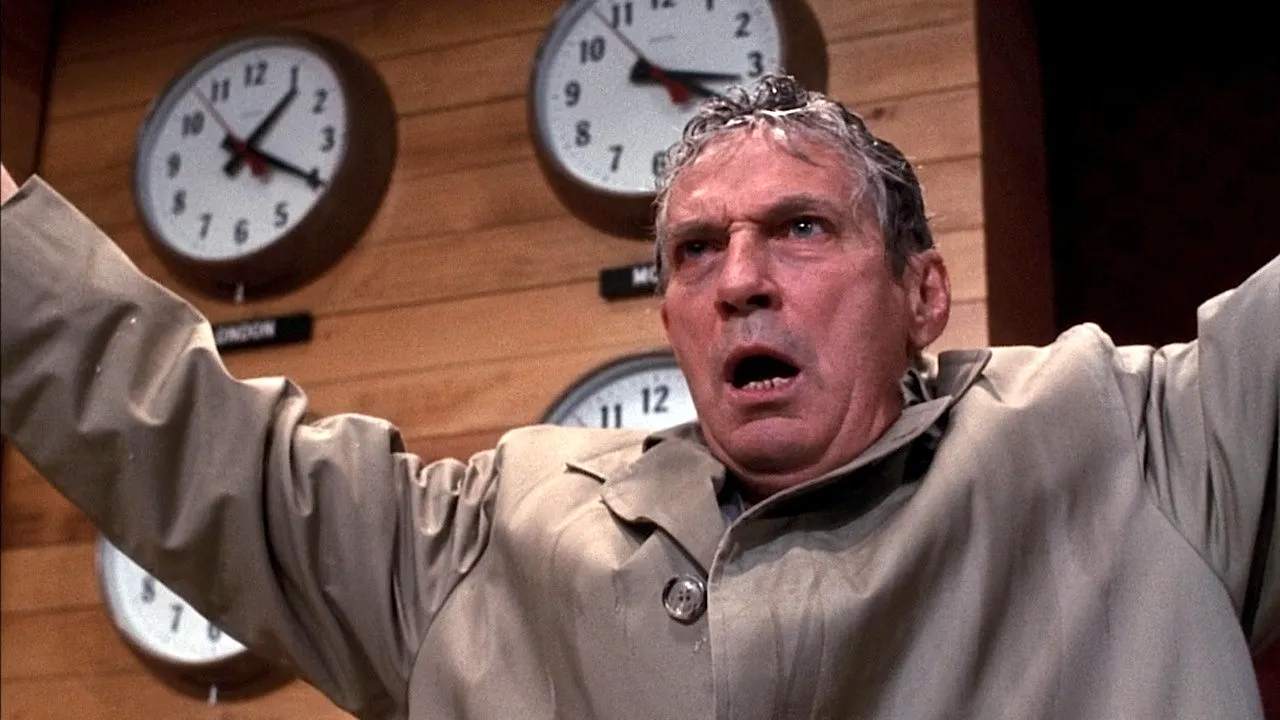 Screenshot via Warner Bros. Pictures
Screenshot via Warner Bros. Pictures3. Dr. Strangelove or: How I Learned To Stop Worrying and Love the Bomb (1964)
1964 brought us one of the greatest political satires of all time in Stanley Kubrick’s Dr. Strangelove or: How I Learned to Stop Worrying and Love the Bomb. The classic film is a black comedy which satirizes the fear of nuclear conflict between the USA and USSR during the Cold War and stars Peter Sellers and George C. Scott, as well as an ensemble cast of Sterling Hayden, Keenan Wynn, and Slim Pickens. As with most of his roles, Sellers steals the show by playing three different characters; a British RAF exchange officer, the President of the United States, and the titular character, a wheelchair-bound nuclear war expert and former Nazi.
The story sees an unhinged Air Force general order a nuclear strike on the Soviet Union, prompting the President and his advisers to desperately try to recall the bombers in order to avoid nuclear war. The film is considered by many to be one of the greatest of all-time and is preserved in the National Film Registry. Dr. Strangelove, like most films on this list, is highly quotable including the classic line, “Gentleman, you can’t fight in here! This is the War Room!”.
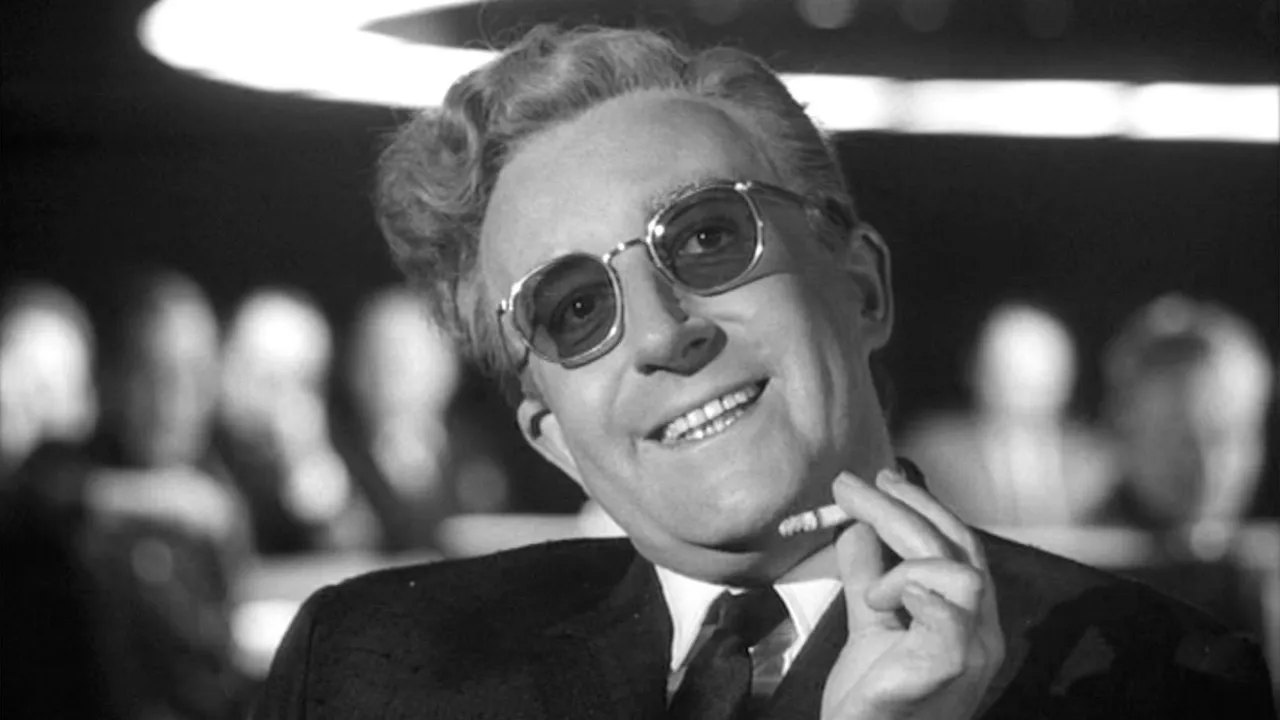 Screenshot via Columbia Pictures
Screenshot via Columbia Pictures2. This Is Spinal Tap (1984)
This hilarious mockumentary follows fictional British rock band Spinal Tap, a group of outrageous musicians who are apparently unaware of how ridiculous they are, as they carry on through increasingly preposterous situations, making almost every scene memorable. Even people who have never seen This Is Spinal Tap can probably reference the scene where Tufnell whole-heartedly endorses an amplifier that goes up to 11 rather than 10, or that part where the band plays a gig that involves a bunch of little people dancing around a miniature replica of Stonehenge.
The film satirizes the behavior and musical pretensions of rock bands and the hagiographic tendencies of rock documentaries such as Gimme Shelter (1970), The Song Remains the Same (1976) and The Last Waltz (1978). The majority of the film’s dialog was improvised, leading to dozens of hours of footage. Although This Is Spinal Tap initially debuted to lukewarm reviews, once audiences picked up on the brilliant satire, it quickly became a cult favorite.
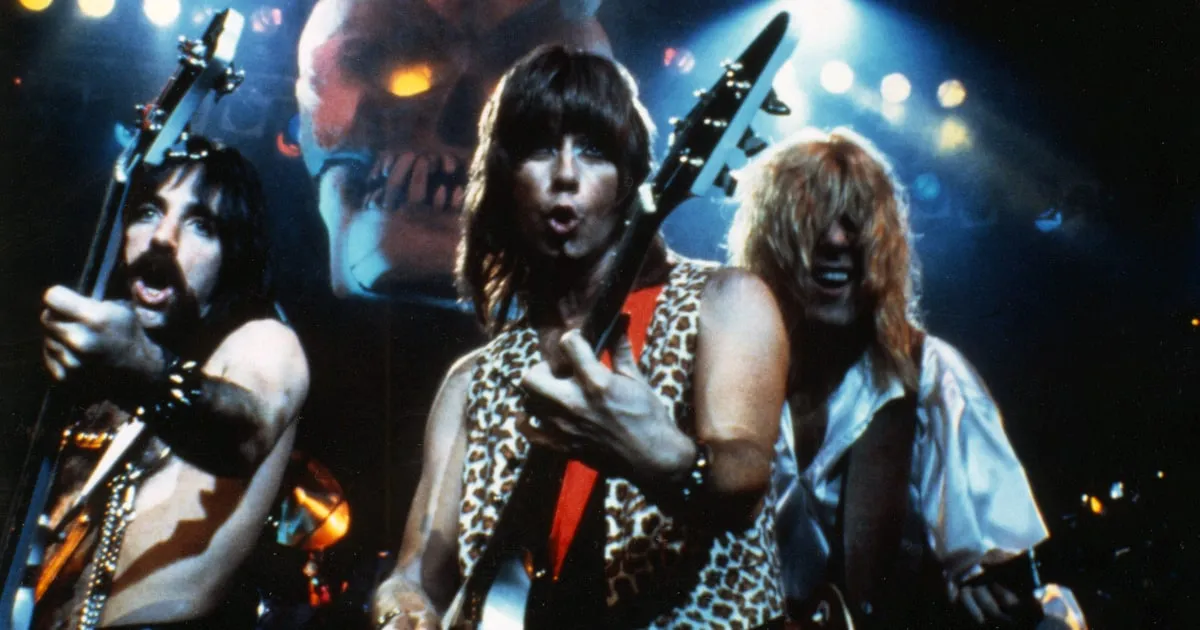 Screenshot via Embassy Pictures
Screenshot via Embassy Pictures1. Blazing Saddles (1974)
This 1974 satirical western comedy was written and directed by Mel Brooks and stars Cleavon Little and Gene Wilder in the lead roles. The film’s story revolves around conniving attorney general Hedley Lamarr (Harvey Korman), who wants to appoints a black railroad worker (Little) as sheriff in order to ruin a western town. Much to the chagrin of Lamarr, the newly appointed sheriff Bart promptly becomes his most formidable adversary. Blazing Saddles is a hilarious film that satirizes the racism obscured by myth-making Hollywood accounts of the American West, with the hero being a black sheriff in an all-white town.
This classic western comedy was well-received upon release and has become one of the most recognizable films of the twentieth century. The film received three Academy Award nominations and in 2006, Blazing Saddles was deemed “culturally, historically, or aesthetically significant” by the Library of Congress and was selected for preservation in the National Film Registry.
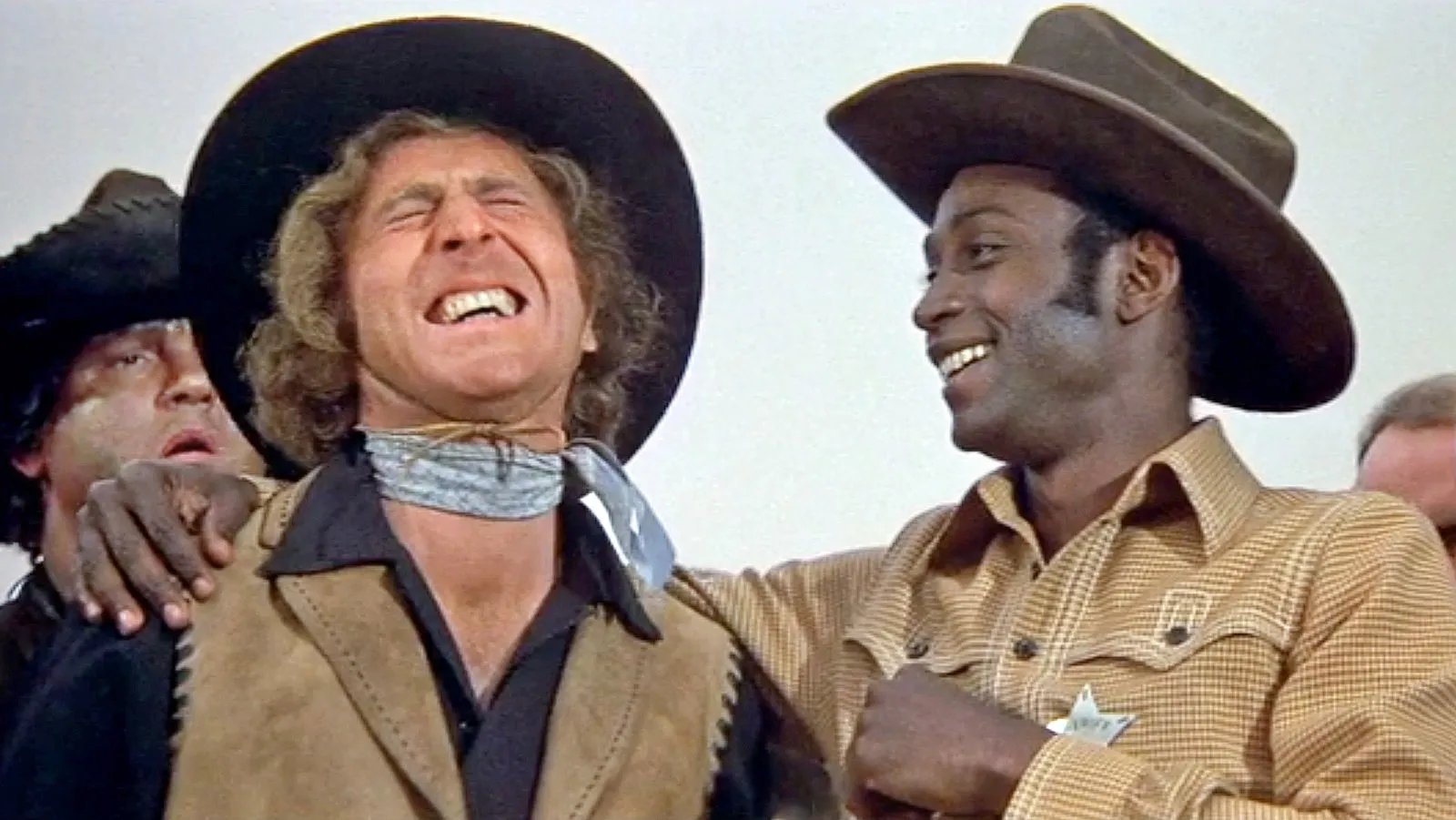 Screenshot via Warner Bros.
Screenshot via Warner Bros.